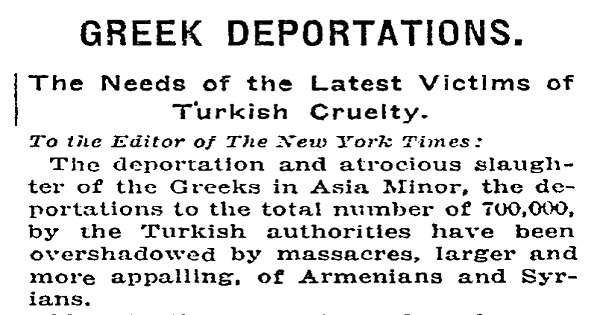
GREEK DEPORTATIONS
The Needs of the Latest Victims of Turkish Cruelty
The New York Times
8 October 1917
To the Editor of The New York Times:
The deportation and atrocious slaugh-
ter of the Greeks in Asia Minor, the de-
portations to the total number of 700,000
by the Turkish authorities have been
overshadowed by massacres, larger and
more appalling, of Armenians and Sy-
rians.
No attentiom was attracted by the sack
in June 1914, of Phocaea, a Greek city
near Smyrna. The account of the de-
truction appeared in the Revue des
Deux Mondes, December 1914. The nar-
rative by the French archaelogist, M.
Felix Sartiaux, an eye-witness, showed
that this massacre of the Greek inhabi-
tants of this city by the Mohameddan
neighbors and Turkish troops matched
every Armenian massacre in its char-
acter, though there was less wanton
murder.
A year later Greek deportation began
on a scale second only to the great
crime in Armenia. At least one-half of
the Greek population has been deported
from the cities and hamlets on the
coast of Asia Minor from the Black Sea
to the eastern end of Cilicia, or around
three-fourths of the coast of this pen-
insula.
For these acts no excuse or pretext
whatever existed in rebellion, resistance,
conspiracy or agitation against the Ot-
toman Empire. This Greek population
has always been free from opposition
to the rule of the Turkish Government.
The only reason for this atrocious crime
was and is to take support from the
claim of both Greece and Italy to the
control of the littoral of Asia Minor on
the ground that it has a large Christian
population. The deportation of 700,000
Greeks from this section will not leave
enough Christians to give body to this
plea of Greece and Italy. But this
is more than a mere diplomatic or
strategic movement. Deportation means
slavery and death to the deported. The
victory of the Allies will undoubtedly
take the Asia Minor littoral from the
Ottoman Empire; but meanwhile the
need of relief for these suffering Greeks
is as urgent as for the Armenians and
Syrians.
The Greeks were the first race to be
slaughtered in the new development
of the Ottoman Empire. The first of
these outrages was a century ago in
1818, and this was followed by the
Turkish massacre in Scio in which 25,000
were killde, 47,000 deported and only
5,000 left alive. It was this that aroused
Europe to action, inspired Byron's
poems, and brought personal activity
by many Americans on behalf of Greek
independence and resulted in the pro-
duction of our own American Powers'
familiar and typical structure, the
"Greek Slave."
All these suffering nationalities are
being relieved by the American Com-
miitee for Armenian and Syrian Relief-
and since it is most probably that Oct.
20 and 21 wiil be designated by the
President as special days for the con-
sideration of the needs of Western Asia,
I venture to urge contributions to the
wants of the survivors of the Greek
deportations. TALCOTT WILLIAMS.
New York, Oct 7. 1917.
The New York Times, October 8, 1917. Source



